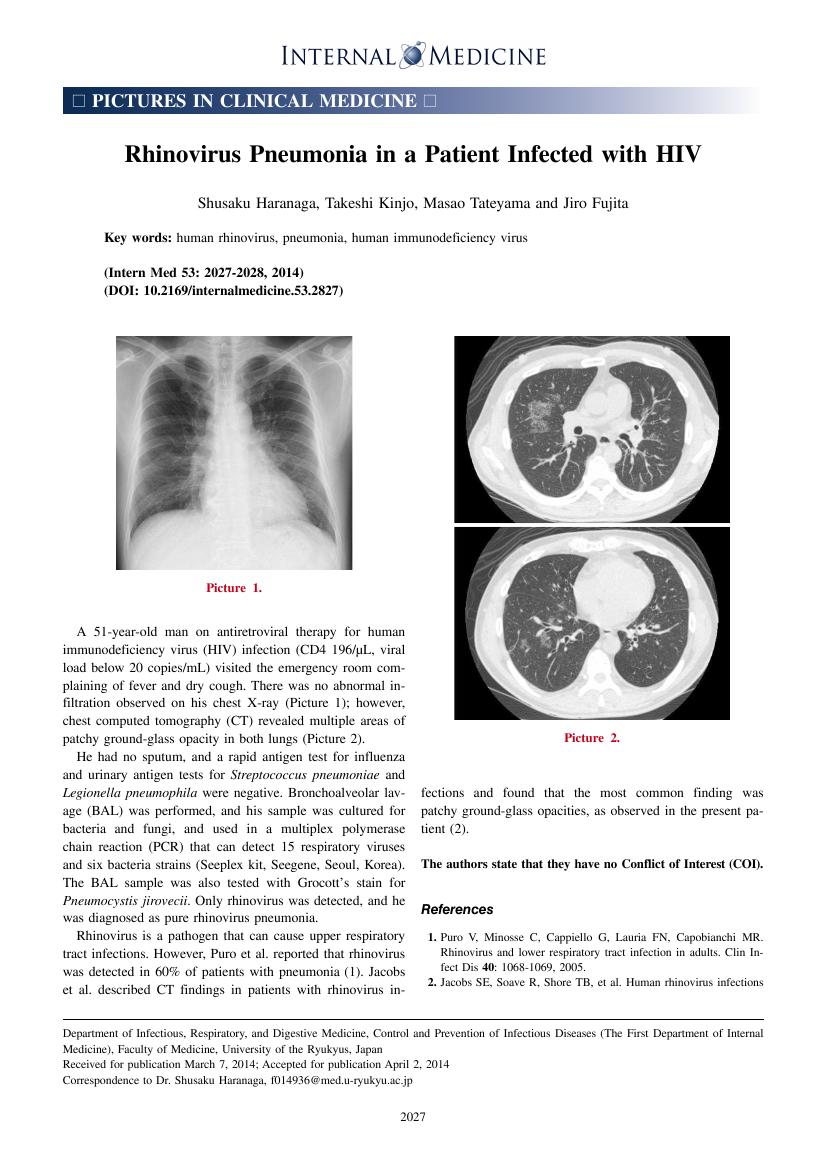- 著者
- Yoshikazu Iha Futoshi Higa Satoko Sunagawa Masamitsu Naka Haley L. Cash Kazuya Miyagi Shusaku Haranaga Masao Tateyama Tsukasa Uno Jiro Fujita
- 出版者
- National Institute of Infectious Diseases, Japanese Journal of Infectious Diseases Editorial Committee
- 雑誌
- Japanese Journal of Infectious Diseases (ISSN:13446304)
- 巻号頁・発行日
- vol.65, no.4, pp.295-300, 2012 (Released:2012-09-21)
- 参考文献数
- 27
- 被引用文献数
- 8 11
Climatic conditions may have affected the incidence of influenza during the pandemic of 2009 as well as at other times. This study evaluated the effects of climatic conditions on influenza incidence in Okinawa, a subtropical region in Japan, during the 2009 pandemic using surveillance data from rapid antigen test (RAT) results. Weekly RAT results performed in four acute care hospitals in the Naha region of the Okinawa Islands from January 2007 to July 2011 were anonymously collected for surveillance of regional influenza prevalence. Intense epidemic peaks were noted in August 2009 and December 2009–January 2010 during the influenza pandemic of 2009. RAT positivity rates were lower during the pandemic period than during the pre- and post-pandemic periods. Lower ambient temperature was associated with higher influenza incidence during pre- and post-pandemic periods but not during the pandemic of 2009. Lower relative humidity was associated with higher influenza incidence during the pandemic as well as during the other two periods. The association of climatic conditions and influenza incidence was less prominent during the pandemic of 2009 than during pre- and post-pandemic periods.
- 著者
- Shusaku Haranaga Takeshi Kinjo Masao Tateyama Jiro Fujita
- 出版者
- The Japanese Society of Internal Medicine
- 雑誌
- Internal Medicine (ISSN:09182918)
- 巻号頁・発行日
- vol.53, no.17, pp.2027-2028, 2014 (Released:2014-09-01)
- 参考文献数
- 2
- 被引用文献数
- 1
- 著者
- Hideta Nakamura Kazuya Miyagi Mariko Otsuki Yuri Higure Naoya Nishiyama Takeshi Kinjo Masashi Nakamatsu Shusaku Haranaga Masao Tateyama Jiro Fujita
- 出版者
- The Japanese Society of Internal Medicine
- 雑誌
- Internal Medicine (ISSN:09182918)
- 巻号頁・発行日
- pp.5244-20, (Released:2020-09-19)
- 参考文献数
- 14
- 被引用文献数
- 9
Treatment with tocilizumab (TCZ) to block interleukin-6 (IL-6) signalling is predicted to mitigate cytokine release syndrome (CRS) caused by coronavirus disease 2019 (COVID-19). However, the adverse effects of TCZ on patients with COVID-19 remain unclear. We herein report a patient with COVID-19 treated with TCZ who developed acute hypertriglyceridaemia. Despite favipiravir treatment, acute respiratory distress syndrome developed in a 45-year-old patient with COVID-19; thus, TCZ was initiated. The triglyceride levels greatly increased after TCZ administration. Physicians should consider the negative impact of TCZ on the lipid profile in patients with COVID-19, although COVID-19-induced CRS itself may be an aggravating factor.
